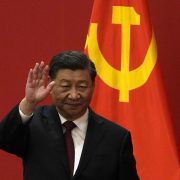Hong Kong was a very important bridge between China, and actually the Chinese Communist Party (CCP), and the rest of the world. Now this bridge is damaged, weakened, and perhaps destroyed forever. But bridges stretch between two or more shores. If the other shore doesn’t accept it but rather rejects it (whatever the reasons), it becomes a pier or nothing at all. Without a bridge this situation would damage and weaken China in a vicious circle with unfathomable consequences.
So far, for example, the official justifications of the Hong Kong National Security Law have been “legalese”: defensive and failing to engage the public critical of the law.
The law tried to address the protests in Hong Kong. The protests were a concern for Beijing but they were also a sign of “liberty” for some people of the territory and foreigners, with or without “ulterior motives”. Do these foreigners want a war with Beijing? If Beijing accepts the notion that they want a war and becomes defensive, then Beijing accepts the “logic of war”.
If Beijing goes for the “logic of war”, then there will be some kind of “war”. Beijing should first fight the logic of war, well before falling into a “war”. If it fights the war and not the logic of war, Beijing has already lost. No matter if Beijing wins or loses the actual war, it will have lost forever the peaceful environment that made China thrive for 40 years. Then China will already be defeated. Plus, there is the real possibility that Beijing would lose the actual war.
Then Hong Kong was a bridge. Also, to have a bridge one needs the consent of the other side. The question should be: How do you get this consent? It is not: «I am what I am and your perceptions are wrong», because then you just give up on the other. Moreover, this attitude gives up on a very important element of the history of the Communist Party. This was about national liberation from foreign oppression and from Chinese leaders who were weak and bungled it before foreign bullying. But it was very much always about China becoming something else.
The issue is cultural before even being political. It’s the history of the CCP.
A century of the CCP
The history of the Chinese Communist Party, which next year will turn 100, is the story of China’s long attempt to become more Western, or at least it was this story until a few years back.
In 1921, when the CCP was founded, for some Chinese intellectuals it represented the most modern and most advanced ideas of Westernization. China even now has this penchant for the latest trends, fashions, gimmicks and technologies. It goes for the most recent one, in order to quickly make up for the gap it perceives.
Then in the wake of the Bolshevik revolution in Russia, communism appeared to be the most recent and efficient evolution of Western thinking, and certainly this was the way in which Marx and the Marxists saw it. Therefore, the Chinese Communists wanted through communism actually to adopt the best, most recent Western ideological development.
This trend was also further stressed in the late 1920s and then in the 1930s and 1940s. When the Nationalists of the KMT, who had come to dominate most of China, turned back to Confucian ideals, the CCP presented itself as an anti-Confucianist and thus in favor of Western ideology, not ancient outdated Chinese ideas.
This way of thinking was also present after the CCP took power and it created a split between Chinese intellectuals who favored the United States and those who were more for the USSR. In a way, Chinese were split between two trends to follow in their modernization, either the United States or the Soviet Union. Yet both were versions of the West.
The United States was the latest offspring of Western Europe, and Russia embodied the latest fashion and historical elaboration in Eastern Europe – both Westerners, although two different types. De facto, Mao Zedong, after a brief dalliance with Moscow in the 1950s, sent China back on a track of worshiping the American version of Westernization. He was well aware that the Communist Party owes a great deal of its public relations success to the American journalist Edgar Snow and his book Red Star Over China. Moreover, it was Nixon’s and Kissinger’s travel to Beijing in the early 1970s which reestablished the role of China in global geopolitics.
Mao’s successor, Deng Xiaoping, reset China’s trajectory to economic growth and modernization by aligning the country strictly with the United States at the end of the 1970s. Then Beijing fought a war against Vietnam with America’s blessing that stopped Soviet advance in East Asia. Furthermore, it helped to arm the Mujahideen in Afghanistan by providing an alternative route to Pakistan in their guerilla warfare against the Soviets. The Afghan war eventually triggered the landslide that brought down the Soviet empire.
China was rewarded for its contribution to the fall of the USSR with invaluable technological transfers from Western Europe and the United States and the privilege of exporting to the US with minimal custom duties, actually lower than those imposed at the time to American friends like Japan or Korea. Therefore, since the 1980s, the United States was the real model to which the Chinese aspired. They wanted to become more American than Americans themselves.
This was actually for the simple reason that Chinese top leaders collectively had reached some kind of consensus that the United States was the best and the most advanced political system in the world, and of the Western systems.
The resistance to becoming “fully American” came from structural fissures in the Chinese political system, which was and is very rigid and hard to adapt to political change. Therefore, while recognizing the US worth, many feared that reform of the political system would bring instability to China and eventually topple the ruling Communist Party. This in turn would bring chaos to the country and disgrace and misfortune to the Communist ruling elite dominating China.
The 2008 cleavage
It is clear that for most of CCP history, the party actually was looking to the West and trying to move China out of its own mold.
Apparently, things started to change after the 2008 US financial crisis. Before that, Chinese decision makers were roughly 90% convinced China should adapt to the American economic/financial system, and 40-50% were inclined to adopt the American political system of some kind. There was concern that political reform would bring about the dissolution of the country, as happened to the USSR in the 1980s with the Gorbachev reforms. But others argued that the USSR problem in the 1980s was that its economy melted down; China conversely had a much better economic basis and it could withstand the shock.
The 2008 financial crisis changed the mindset. Most people lost faith in the American economic system, which failed to prevent the crisis, and even after the crisis, it failed to correct the structural mistakes and punish the guilty.
Having lost faith in the US economy, the Chinese also lost all their faith in the American political system. Many started to believe that the US was in decline and this was supported by a vast American declinist literature. They came to believe that China not only was on the rise but was close to the top, and it could do without America.
When in 2013 China launched its new Silk Road (which would eventually become the BRI, the Belt and Road Initiative), China invited the Americans to join in, but shrugged them off when China felt that the Americans were being difficult. The Chinese then proceeded on its BRI by themselves, despite US opposition.
It was not only that. After the financial crisis, the Communist Party started to move in another direction. It revamped the old neo-Confucianist ideas the KMT had tried and failed to use as official state ideology in the 1930s.
It is certainly right for China to be proud of its heritage, and it should try to make the best use of it. However, brushed up neo-Confucianism is no substitute for full-fledged modernization. Despite some easy rhetoric, no country has used Confucian ideals as a replacement for Western political systems. Korea, Japan, and Taiwan may be Confucian in one way or another, but they certainly are highly functional and effective Western-style democracies.
Singapore is something different but it is just a city-state. Its model is impossible to export to China, and the Chinese Communist Party is even less structured than the Singapore model.
Moreover, the failures of the KMT – cultural before being political – are testament to the weakness of the idea of reverting to Confucianism in modern times. The Communist Party won culturally in the 1930s and 1940s by fighting Confucian revivals. The Communist Party ought not to follow the KMT; it should rather heed its own history.
Back on track again?
Are things changing now, as China is feeling the pressure of American trade war on many fronts that go well beyond commerce?
It is hard to say but perhaps there should be a lesson there for the Communist Party as it prepares to celebrate its centenary next year. The lesson is that the CCP cannot have been wrong for most of its history.
For most of its history, the essential part is that it tried to become more Western than the Westerners. It gave up on it when it felt that it had already achieved the goal. Now that it is becoming clear that the goal has not been achieved and that the situation is far more complex than originally perceived a decade ago, perhaps the CCP should pick up again from where it left off – that is, economic and political reform.
This reform was stopped in its tracks twice: once in 1988-1989, when the policy decision for political and systemic reform that came out of the 13th Party Congress was shelved in fear of massive disruptions. The second time was more recently, as we said, right after the American financial crisis. With hindsight we could say that if China had reformed its political system some time ago, now it would be much better off. And the Communist Party of China would have fulfilled the historical task it took on 99 years ago.
The difficulties of its own system are also revealed in China’s difficulty in its expansion out of China, where more Chinese companies venture and more security would be required. These tasks in the West are delegated to private security companies.
The Chinese Communist Party will never delegate coercive and political power to Chinese companies for fear that they might eventually wield that power against Beijing. The power of Zhou Yongkang is a recent example. Endowed with the money of the largest SOE (China Petroleum Corporation, CNPC) and heading the mighty security apparatus, Zhou was almost a kingmaker for a few months. President Xi Jinping can’t repeat this mistake.
In Western countries, the open power of the parliament manages to stem similar temptations by privateers. Open systems make coups more difficult and private military companies can operate without too much fear that they will stray too much. In closed systems, even this can’t be guaranteed.






Western Democracy, as viewed by China now, required constant warfare against other nations to maintain its own stability. Two World Wars, Korean War, Vietnam War, War on Drugs, First Iraq War, War in Balkans, War on Terror, all involved American and its military industrial complex. Therefore China do not want this Western Democracy anymore. China “Communist” plan is to have trade based world diplomacy, not bombs. Confucian views is always better than Colonial views. Economic and technological advancements of the Western Societies through Unlimited Wars should not be considered something to thrive for.
Thank you. Much appreciated.
I’m afraid sometimes, amidst the pandemic more than most times, that “entropy” is indeed the human condition, and so we are all, humans and our civilizations, in a perennial state of decline. Sometimes it is disguised by the trappings of progress, but in the end all empires decline and fall, civilizations end, and our own lives come to the same final point that all must encounter.
So one can have a certain understanding of the “declinist” literature. ” Many started to believe that the US was in decline and this was supported by a vast American declinist literature. They came to believe that China not only was on the rise but was close to the top, and it could do without America.”
The U.S. seemed to be in its final decline/collapse in 1860-1861 as the Civil War began; in 1929-1933 as the nation was in the grip of the Great Depression; in 1975, after the ignominious defeat in Vietnam; even in the 1980s (though today all the rewriters of history would have us believe that our “victory” in the Cold War was ordained by “God” and made possible by the toughness and wisdom of the sainted Ronald Reagan — wonderful mythology) when Paul Kennedy’s thesis about “imperial overstretch” seemed to have more to do with the U.S. than with the USSR; and as you say in 2008 amidst the US and global financial crisis.
The Japanese, among others, plainly believed in the 1980s that the U.S. was in a steady, final decline, while Japan had unlocked the mystery of perpetual prosperity through skilled economic management, a sustained peacetime economy, and societal discipline rooted in the “superiority” of Japanese culture. Of course we know what happened.
The contemporary Chinese mode of triumphalism closely resembles, to my eyes anyway, the sort of thinking and rhetoric we saw and heard from Japanese, especially after Ezra Vogel’s book “Japan As Number One” resonated so profoundly within Japanese society and around the world.
Life is never so easy to predict, much less the trajectory and immediate fate of civilizations.